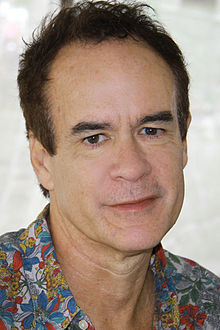|
Robert Antoni
Robert Antoni (born 1958) is a West Indian writer who was awarded the 1999 Aga Khan Prize for Fiction by The Paris Review for My Grandmother's Tale of How Crab-o Lost His Head. He is a Guggenheim Fellow for 2010 for his work on the historical novel As Flies to Whatless Boys.[1] Early lifeRobert Antoni was born in the United States of Trinidadian parents and grew up largely in the Bahamas, where his father practised medicine. He says his "fictional world" is "Corpus Christi", the invented island (based on Trinidad) that he introduced in his first novel, Divina Trace (1991).[2] Antoni studied at Duke University and in the creative writing programme at Johns Hopkins University, before joining the Iowa Writers' Workshop at the University of Iowa,[3] where he began working on Divina Trace. He has said that he spent a total of ten years completing the novel, which won the Commonwealth Writers' Prize for best first novel in 1992.[4] CareerAntoni lived for a time in Barcelona and taught at the University of Miami from 1992 to 2001. In 2004, he began teaching at Barnard College, Columbia University and The New School.[5] In 2010, he was a Guggenheim Fellow.[1] His novel As Flies to Whatless Boys was the overall winner of the 2014 OCM Bocas Prize for Caribbean Literature. At the award ceremony on 26 April, Antoni pledged to share the US$10,000 prize money with the other finalists, Lorna Goodison (winner of the poetry category for Oracabessa) and Kei Miller (winner of the literary non-fiction category for Writing Down the Vision: Essays and Prophecies).[6][7] Kei Miller and Antoni were both features presenters at the 2018 Key West Literary Seminar: Writers of the Caribbean.[8] Antoni currently resides in New York City[3] where he teaches literature at The New School for Public Engagement.[9] Awards and honours
BibliographyNovels
Nonfiction
Anthologies
See alsoNotes
References
External links
|
||||||||||||||||
